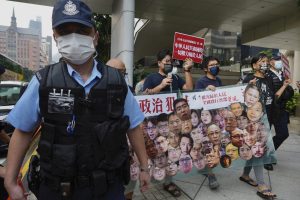At this time, Hong Kong is usually buzzing with political activity. Every four years, in the run up to elections for the Legislative Council (LegCo) – the city’s parliament – the streets would come alive as hopeful politicians take part in animated campaigns to win supporters, shouting promises into megaphones in a sea of colorful banners.
This year, there is no such energy on display.
The upcoming LegCo election in late December will be the second major election to take place after Beijing imposed a sweeping national security law (NSL) on the city last year, a law that criminalized broad forms of dissent. Originally scheduled for 2020, right at the heel of a large-scale pro-democracy movement, the election was postponed to this year by authorities, who cited coronavirus-related concerns.
Since then, the Chinese and Hong Kong government have implemented a series of dramatic changes to the electoral processes, such as cutting the number of directly elected seats and implementing a rigorous vetting process for candidates, which must first be approved as “patriots” in order to run. Designed by Beijing and approved by pro-government Hong Kong lawmakers, the sweeping changes effectively sever any pathways for dissenting voices to be elected into the legislative body.
“Candidates will not know whether they will be chucked out or not,” Emily Lau, former chairperson of the Democratic Party who served as a legislative councillor between 1991 and 2016, told The Diplomat. “This is very much unlike the elections I’ve taken part in, and hence why I said very early on when they [announced they] were going to revamp the system that my party should not take part.”
A Political Shake-up of the System
Under the new framework, the Election Committee has overwhelming political power in shaping the LegCo election. The reformed Election Committee is composed of industry representatives and pro-government individuals who are avid allies of Beijing – only one member of the Committee represents the oppositional camp.
After the restructuring, the 1,500 members of the committee are now responsible not only for “electing” the chief executive of Hong Kong, but they will also nominate and appoint 40 of the committee’s own members to serve concurrently in the 90-seat legislature. LegCo will now only have 20 directly-elected seats. The remaining 30 seats will be occupied by candidates from the functional constituencies to represent sectors such as finance, labor, and real estate. Introduced during the British colonial era, functional constituencies allow elites in special interest groups to vote in lieu of the wider public.
Prior to the restructuring, Hong Kong citizens were able to elect 40 out of 70 legislators through universal suffrage, which amounted to 53 percent of the seats. Under the new framework, however, the percentage of directly elected legislators drops to only 22 percent.

































